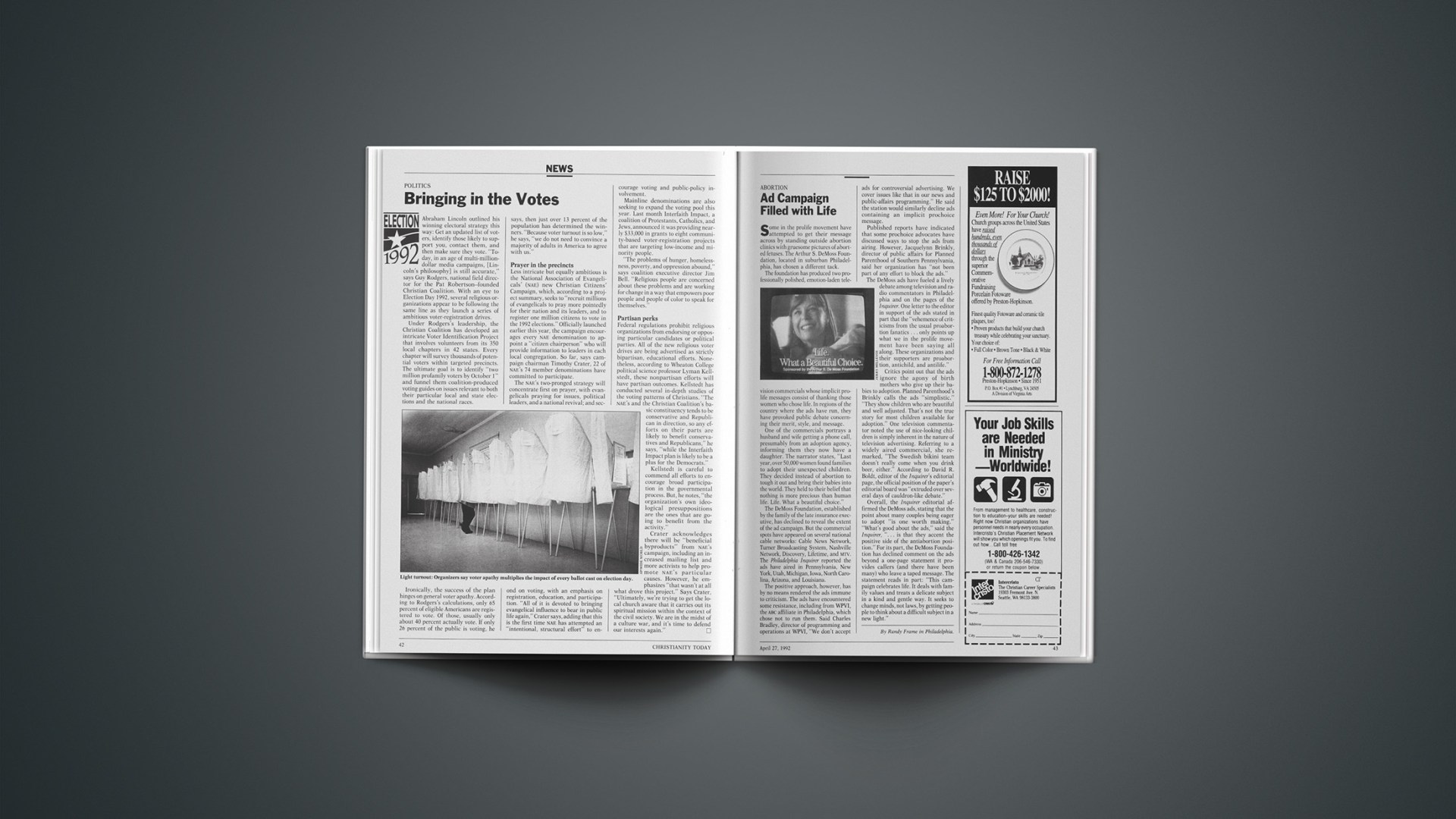Some in the prolife movement have attempted to get their message across by standing outside abortion clinics with gruesome pictures of aborted fetuses. The Arthur S. DeMoss Foundation, located in suburban Philadelphia, has chosen a different tack.
The foundation has produced two professionally polished, emotion-laden television commercials whose implicit prolife messages consist of thanking those women who chose life. In regions of the country where the ads have run, they have provoked public debate concerning their merit, style, and message.
One of the commercials portrays a husband and wife getting a phone call, presumably from an adoption agency, informing them they now have a daughter. The narrator states, “Last year, over 50,000 women found families to adopt their unexpected children. They decided instead of abortion to tough it out and bring their babies into the world. They held to their belief that nothing is more precious than human life. Life. What a beautiful choice.”
The DeMoss Foundation, established by the family of the late insurance executive, has declined to reveal the extent of the ad campaign. But the commercial spots have appeared on several national cable networks: Cable News Network, Turner Broadcasting System, Nashville Network, Discovery, Lifetime, and MTV. The Philadelphia Inquirer reported the ads have aired in Pennsylvania, New York, Utah, Michigan, Iowa, North Carolina, Arizona, and Louisiana.
The positive approach, however, has by no means rendered the ads immune to criticism. The ads have encountered some resistance, including from WPVI, the ABC affiliate in Philadelphia, which chose not to run them. Said Charles Bradley, director of programming and operations at WPVI, “We don’t accept ads for controversial advertising. We cover issues like that in our news and public-affairs programming.” He said the station would similarly decline ads containing an implicit prochoice message.
Published reports have indicated that some prochoice advocates have discussed ways to stop the ads from airing. However, Jacquelynn Brinkly, director of public affairs for Planned Parenthood of Southern Pennsylvania, said her organization has “not been part of any effort to block the ads.”
The DeMoss ads have fueled a lively debate among television and radio commentators in Philadelphia and on the pages of the Inquirer. One letter to the editor in support of the ads stated in part that the “vehemence of criticisms from the usual proabortion fanatics … only points up what we in the prolife movement have been saying all along. These organizations and their supporters are proabortion, antichild, and antilife.”
Critics point out that the ads ignore the agony of birth mothers who give up their babies to adoption. Planned Parenthood’s Brinkly calls the ads “simplistic.” “They show children who are beautiful and well adjusted. That’s not the true story for most children available for adoption.” One television commentator noted the use of nice-looking children is simply inherent in the nature of television advertising. Referring to a widely aired commercial, she remarked, “The Swedish bikini team doesn’t really come when you drink beer, either.” According to David R. Boldt, editor of the Inquirer’s editorial page, the official position of the paper’s editorial board was “extruded over several days of cauldron-like debate.” Overall, the Inquirer editorial affirmed the DeMoss ads, stating that the point about many couples being eager to adopt “is one worth making.” “What’s good about the ads,” said the Inquirer, “… is that they accent the positive side of the antiabortion position.” For its part, the DeMoss Foundation has declined comment on the ads beyond a one-page statement it provides callers (and there have been many) who leave a taped message. The statement reads in part: “This campaign celebrates life. It deals with family values and treats a delicate subject in a kind and gentle way. It seeks to change minds, not laws, by getting people to think about a difficult subject in a new light.”
By Randy Frame in Philadelphia.










